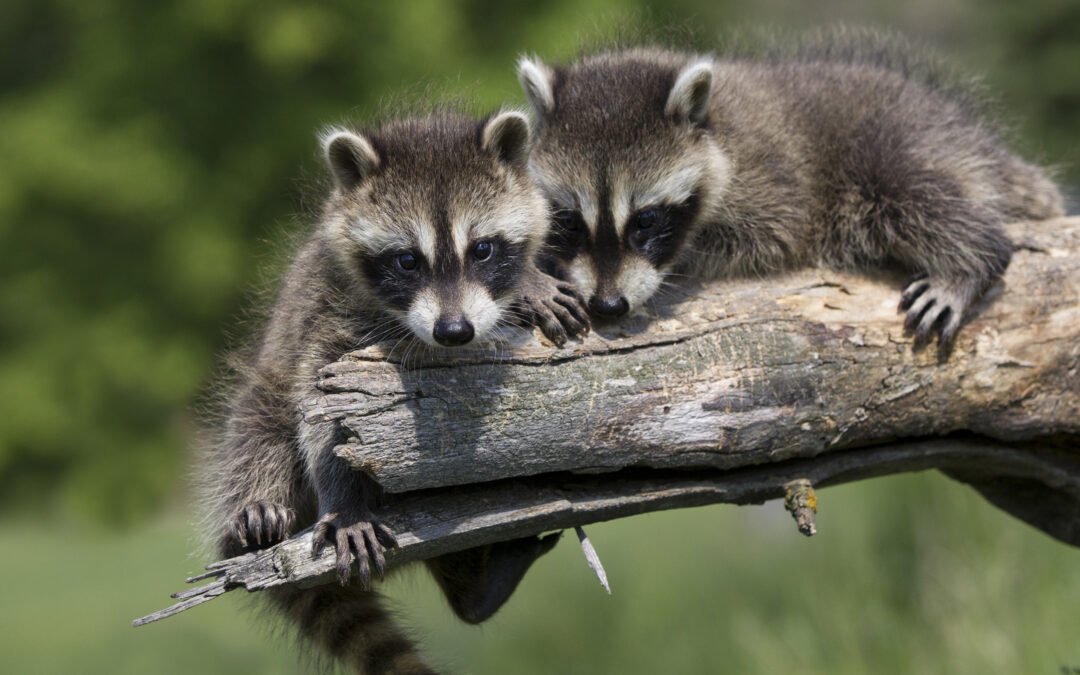Submitted by Pam Varga, Sahli Park Manager
With its black markings around its eyes and its habit of raiding gardens, chicken coops, bird feeders, and garbage cans, “Masked Bandit” is a very appropriate nickname for the raccoon. Raccoons are omnivores. Their diet consists of a wide variety of plants and animals: fruits, veggies, berries, buts, seeds, fungi, insects, spiders, snails, snakes, frogs, turtles, clams, crayfish, fish, ground nesting birds, baby birds, eggs, mice, muskrats, small mammals, carrion, and…garbage! The name “raccoon” comes from the Algonquin Native American word “arakun” which means “he who scratches with his hands,” and the scientific name Procyon lotor means “washer.”
Raccoons have often been observed to dip their food in water before eating. Not all raccoons do this, and they do not do it all the time. No one is exactly sure why raccoons “wash” their food. It may be to soften it, or they may be using their sensitive paws to separate the edible parts. The raccoon may also be searching for food in the shallow water of a pond or stream.
Raccoons are intelligent, curious, and have good memories. They are excellent climbers and swimmers.
While the usually ramble slowly, raccoons can run at up to 15 miles per hour when threatened. Resembling a human hand, the raccoon’s front paws have four long strong fingers and a thumb. Their front paws are very agile, allowing the animal to snatch an insect out of the air, catch a fish or frog, turn a doorknob, lift a latch, open a jar, untie knots, or open a garbage can. They have excellent senses of touch, hearing, smell, and sight, and they can make over 200 different sounds and 15 different calls to communicate with each other.
Raccoons do not mate for life. Before the babies, called kits, cubs, or pups, are born in April or May, the male leaves the female. He may have more than one mate, but the female has only one mate each season.
There are usually four kits in a litter, but there may be anywhere from one to seven. For their first few weeks, the kits stay in the den with their mother. At about 8-12 weeks, she will lead them out of the den and teacher them how to hunt for food. She is a good mother taking care of and fiercely protecting her young for almost a year.
Raccoons do not truly hibernate. When the temperatures go below 25 degrees, they will go into their dens and fall into a deep sleep, but their heartbeat and body temperature do not drop significantly as in true hibernation. On warmer days, they will leave their dens and search for food. While sleeping, they will survive on fat stored in their bodies during summer feeding and will often lose half of their body weight. A group of raccoons may winter together in a communal den which also helps them survive winter’s cold.
Baby raccoons do not make good pets. They may be cute and friendly and adapt to being handled, but when they become adults, their natural instincts kick in. Raccoons are wild animals, and if kept confined, they will become aggressive. Raccoons, even babies, are known to carry many parasites and diseases that can affect humans.
Sometimes a baby raccoon will become separated from its mother while they are out looking for food. If you see this cute furry little critter, do not attempt to pick it up unless it is obviously injured. Mother may be nearby waiting for you to leave. The kit will stay where it is until she returns, sometimes as much as a day later. If the kit is still there after 24 hours, is continuously crying, or is injured, call a professional, the Chippewa Police (724-843-8227), or the Pennsylvania Game Commission Southwest Region (724-238-9523).
Raccoons are nocturnal and do most of their foraging for food at night. If you find the Masked Bandit to be a nuisance, here are some tips to keep them away:
- Spray peppermint oil, or spread chili flakes, cayenne pepper, Epsom Salts, coffee grounds, or a commercial predator urine around the area and reapply after it rains.
- Leave bright lights on at night. n Leave a sprinkler gently running. You can use a motion detector that will turn it on when a raccoon approaches.
- Soak rags in vinegar or ammonia and leave them around the area.
- Bring garbage cans and pet food indoors.
- Use pole-mounted bird feeders and smear Vaseline on the poles—we have found this very effective at Sahli Park).
Of course, in addition to being dexterous and intelligent, raccoons are also persistent, and some of these methods may not work. Just do not tell the raccoons that!
The Masked Bandit may be a nuisance, but raccoons play an important role in the ecosystem by controlling rodent and other animal populations.







